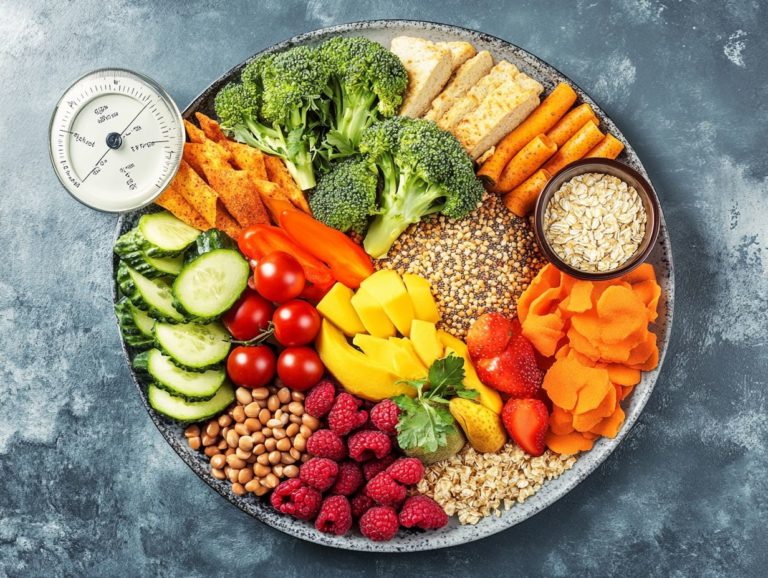Healthy Eating Habits for Weight Management
Maintaining a healthy weight involves more than just counting calories. It’s a complete method that includes proper nutrition, balanced meals, and regular exercise.
This article explores the crucial role healthy eating plays in weight management. Incorporating nutrient-dense foods and practicing portion control can make a significant difference.
It also emphasizes the importance of physical activity. We will outline common pitfalls and sustainable strategies for achieving long-term success.
Discover practical tips that will transform your relationship with food and empower your weight management journey!
Contents
- Key Takeaways:
- The Importance of Healthy Eating Habits for Weight Management
- Creating a Balanced Diet for Weight Management
- Incorporating Physical Activity into a Healthy Eating Plan
- Common Pitfalls to Avoid in Healthy Eating Habits
- Maintaining Healthy Eating Habits for Long-Term Weight Management
- Frequently Asked Questions
- What are some healthy eating habits for weight management?
- Why is portion control important for weight management?
- What are some examples of balanced meals for weight management?
- How can minimizing processed and sugary foods help with weight management?
- Is it okay to have cheat meals while trying to manage my weight?
- How can I stay motivated to maintain healthy eating habits for weight management?
Key Takeaways:

Proper nutrition is essential for weight management. It fuels the body and supports weight loss. A balanced diet, full of nutrient-dense foods and portion control, is key for sustainable weight management. Regular physical activity enhances these efforts.
The Importance of Healthy Eating Habits for Weight Management
Healthy eating habits are crucial for managing your weight effectively. They can also reduce the risk of chronic diseases like heart disease and type 2 diabetes.
By following dietary guidelines, you can make better food choices. This contributes to a balanced diet and leads to sustainable weight management.
Adding fruits, vegetables, whole grains, and low-fat dairy to your meals can boost nutrition while helping to combat obesity risks.
Developing habits like portion control and recognizing emotional eating empowers you to manage your well-being and maintain a healthy weight.
Understanding the Role of Nutrition in Weight Loss
Nutrition is fundamental to your weight loss journey. It provides the framework for making informed food choices that meet your dietary needs.
By learning how food groups work together in a balanced diet, you can see the value of including fruits, vegetables, whole grains, lean proteins, and healthy fats in your meals.
Each group offers vital nutrients that support health and help maintain the calorie deficit needed to lose weight. For instance, proteins maintain muscle and keep you feeling full, while fiber-rich foods aid digestion and curb snacking.
Adopting a balanced nutritional approach can significantly impact your weight loss outcomes. It fosters habits that encourage long-term success.
Creating a Balanced Diet for Weight Management
Building a balanced diet for weight management requires thoughtful choices from all food groups. This ensures your nutritional needs are met while keeping calorie intake in check.
Choosing Nutrient-Dense Foods

Opting for nutrient-dense foods is vital for effective weight management and overall health. These foods provide maximum nutrition with fewer calories.
Adding a variety of fruits and vegetables to your meals enhances flavor and provides essential vitamins, minerals, and antioxidants.
These nutritional powerhouses can lower the risk of chronic diseases, such as heart disease and diabetes. Including lean proteins, like fish and legumes, along with whole grains like quinoa is crucial for maintaining muscle mass and overall health.
By making nutrient-dense choices, you support long-term health while enjoying a satisfying diet.
Portion Control and Meal Planning
Portion control and meal planning are vital for healthy eating and calorie management. Understanding serving sizes helps you make better choices, allowing you to enjoy a balanced diet without going over your daily calorie limit.
Portion control isn t just about limiting the food on your plate; it s also about using smaller plates or bowls. This creates the illusion of a more satisfying meal. Smart meal planning encourages variety, making it easier to choose healthier options.
For example, preparing meals in advance with pre-measured ingredients empowers you to resist temptation and fosters a more mindful approach to eating.
Incorporating Physical Activity into a Healthy Eating Plan
Incorporating physical activity into your healthy eating plan is essential for effective weight management.
This dynamic duo plays a crucial role in reducing risks linked to obesity and chronic diseases, laying the groundwork for a healthier, more vibrant life.
The Benefits of Exercise for Weight Management
Regular exercise brings fantastic benefits for your weight management journey. It enhances both your physical health and emotional well-being while significantly reducing the risk of obesity-related health issues.
Engaging in physical activity can dramatically improve your metabolic health. Research shows that consistent exercise can lower blood sugar levels and boost insulin sensitivity, making it essential for preventing type 2 diabetes.
Exercise is also a great mood booster. Studies indicate that those who embrace regular workouts enjoy a 30% lower risk of depression and anxiety.
These compelling statistics highlight the importance of maintaining an active lifestyle. It s a strong reason to weave exercise into your daily routine for a wealth of mental and physical benefits.
Common Pitfalls to Avoid in Healthy Eating Habits

Recognizing common pitfalls in healthy eating habits is essential for anyone committed to maintaining a balanced diet and effectively managing weight.
By being aware of these traps, you can steer clear of health issues linked to unhealthy foods.
Identifying and Overcoming Challenges
Identifying and overcoming challenges related to healthy eating habits is crucial for effective weight management and enhancing overall health.
You might find yourself grappling with emotional eating, using food as a coping mechanism during stress, which can lead to poor choices. The abundance of convenient yet unhealthy options can make pursuing a balanced diet feel daunting.
To navigate these challenges effectively, develop a deeper understanding of your dietary needs and triggers. Practical strategies like meal planning, mindful eating, and incorporating nutritious snacks can enhance your ability to maintain healthier habits.
By recognizing emotional connections to food and adopting a more informed approach, you can cultivate a healthy relationship with food that supports your long-term wellness goals.
Maintaining Healthy Eating Habits for Long-Term Weight Management
Maintaining healthy eating habits for long-term weight management requires commitment and sustainable strategies, such as understanding the importance of food sources for weight management, that foster a balanced lifestyle.
Choose wisely today to secure a healthier tomorrow!
Sustainable Strategies and Tips
Building sustainable strategies is essential for long-term weight management. These habits also enhance your overall well-being.
Meal planning empowers you to choose nutritious foods. Varying your food options makes meals enjoyable and boosts nutrient intake.
Healthy cooking techniques like steaming, grilling, or baking can transform your meals. Mindful choices deepen your connection with food and promote a healthier lifestyle.
Frequently Asked Questions

What are some healthy eating habits for weight management?
- Practice portion control.
- Eat a balanced diet with fruits and vegetables.
- Minimize processed and sugary foods.
- Stay hydrated with water.
Why is portion control important for weight management?
Portion control is vital for managing weight because it helps you consume the right amount of calories. Eating too much can lead to weight gain, while too little can deprive your body of essential nutrients.
What are some examples of balanced meals for weight management?
Examples of balanced meals include:
- A grilled chicken breast with steamed vegetables and quinoa.
- A salad with mixed greens, grilled salmon, and avocado.
- A veggie stir-fry with brown rice and tofu.
How can minimizing processed and sugary foods help with weight management?
Minimizing these foods is crucial as they are often high in calories and low in nutrients. Consuming too many can lead to weight gain and increase health risks like diabetes and heart disease.
Is it okay to have cheat meals while trying to manage my weight?
Occasional cheat meals are acceptable, but don t make them a regular occurrence. Balance them with healthy choices and regular exercise!
How can I stay motivated to maintain healthy eating habits for weight management?
Staying motivated can be challenging. Set realistic goals, track your progress, and surround yourself with a supportive community. Remember the benefits of a healthy lifestyle and enjoy the foods you eat without excessive restriction.
Start your journey toward healthier eating habits today!






